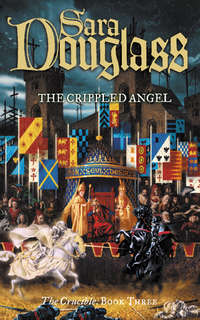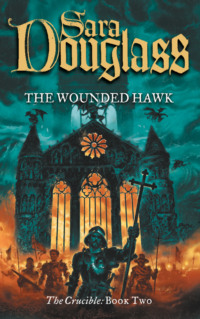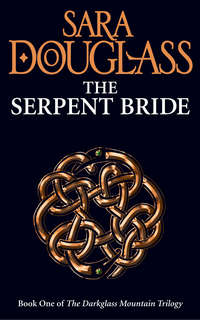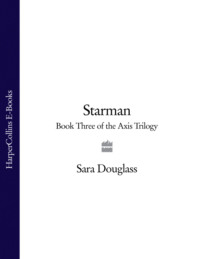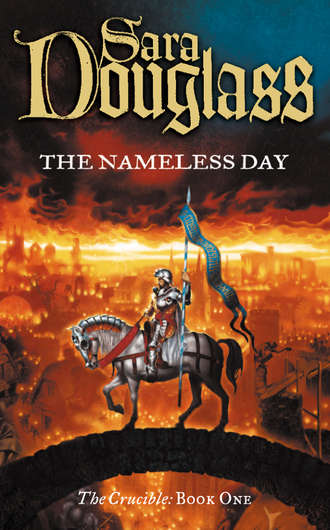
Полная версия
The Nameless Day

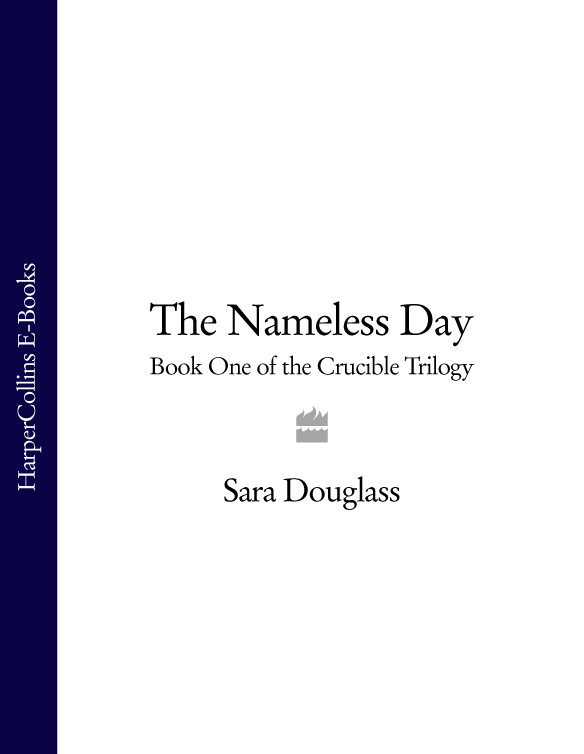
The Nameless Day
Sara Douglass
The Crucible: Book One

In memory of my most devoted fan,
MICHAEL GODWIN
10th September 1981 – 16th March 1998
Table of Contents
Cover Page
Title Page
Author’s Note
Prologue
ROME
I
II
III
IV
V
VI
VII
VIII
IX
GERMANY
I
II
III
IV
V
VI
VII
VIII
FRANCE
I
II
III
IV
V
VI
VII
VIII
IX
X
XI
XII
XIII
XIV
XV
XVI
XVII
XVIII
XIX
XX
XXI
XXII
ENGLAND
I
II
III
IV
V
VI
VII
VIII
IX
X
XI
XII
XIII
XIV
XV
XVI
XVII
XVIII
XIX
XX
XXI
XXII
XXIII
XXIV
XXV
Epilogue
Glossary
A JIGGE (FOR MARGRETT)
A JIGGE (FOR MARGRETT) (MODERNISED VERSION)
About the Author
Also by Sara Douglass
Copyright
About the Publisher
Author’s Note
Time travel is not only theoretically possible, travel into our future has already been achieved (albeit on a tiny scale of a few seconds or minutes). Travel into our past is more problematic. How would interfering with our past affect our present? Some physicists argue that sending someone into the past creates a “parallel universe”—the mere presence of someone in a past time alters that world’s future to such an extent that a different future is necessarily created: a parallel universe (or world) to the one we live in.
The three books of “The Crucible” are set, not in the medieval Europe of our past, but in the medieval Europe of a parallel universe: the insertion of even one fictional character amongst a host of historical characters necessarily creates that parallel world. Thus, while there are many similarities between our past and the world of “The Crucible”, there are also many differences. The entire period of the Hundred Years War, for example, has been compressed so that the Battle of Poitiers is fought at a later date than in our past, and Joan of Arc appears at an earlier date.
Although some dates and “facts” have altered, the spirit of “The Crucible” remains identical to that of our medieval Europe. Something strange happened in the fourteenth century…something very, very odd. The fourteenth century was an age of unprecedented catastrophe for western Europe: widespread famine due to climate change, economic collapse, uncontrollable heresies, social upheaval, endemic war and, to compound the misery, the physical and psychological devastation of the Black Death. In all of recorded history there has never been before or since a period of such utter disaster: one half of Europe’s population died due to the effects of famine, war and the Black Death. As a result, Europeans emerged from the fourteenth century profoundly—and frighteningly—changed. Medieval Europe had been an intensely spiritual society: the salvation of the soul was paramount. Post-fourteenth century Europe abandoned spirituality for secularism, materialism and worldliness. Its peoples embraced technology and science, and developed the most aggressively invasive mentality of world history. Why this profound shift from the internal quest for spiritual salvation to a craving for world domination? Was it just the end result of over a hundred years of catastrophe…or was there another reason?
“The Crucible” presents an explanation couched in a medieval understanding of the world rather than in terms more familiar to our modern sensibilities. Medieval Europe was a world of evil incarnate, a world where demons and angels walked the same fields as men and women; a world where the armies of God and of Satan arrayed themselves for the final battle…we now live in the aftermath of that battle, but are we sure who won?
Sara Douglass
Bendigo, 2000
Prologue
The Friday within the Octave of All Saints
to the Nameless Day
In the twenty-first year of the reign of Edward III
(7th November to Tuesday 23rd December 1348)
—St Angelo’s Friary, Rome—
“Brother Wynkyn? Brother Wynkyn? Sweet Jesu, Brother, you’re not going to leave us now?”
Brother Wynkyn de Worde slapped shut the weighty manuscript book before him and turned to face Prior Bertrand. “I have no choice, Bertrand. I must leave.”
Bertrand took a deep breath. Sweet Saviour, how could he possibly dissuade Brother Wynkyn?
“My friend,” he said, earning himself a sarcastic glance from Wynkyn. “Brother Wynkyn…the pestilence rages across Christendom. If you leave the safety of Saint Angelo’s—”
“What safety? Of the seventeen brothers who prayed here five weeks ago, now there is only you and me and two others left. Besides, if I choose to hide within these ‘safe’ walls a far worse pestilence will ravage Christendom than that which currently rages. I must go. Get out of my way.”
“Brother, the roads are choked with the dying and the brigands who pick their pockets and pluck the rings from their fingers.” Prior Bertrand moderated his voice, trying to reason with the old man. Brother Wynkyn had ever been difficult. Bertrand knew that Wynkyn had even shouted down the Holy Father once, and Bertrand realised there was no circumstance in which he could hope for respect from someone who was powerful enough to cow a pope. “How can you possibly overcome all the difficulties and the dangers roaming the roads between here and Nuremberg? Stay, I beg you.”
“I would condemn the earth to a slow descent into insanity if I stayed here.” Wynkyn lowered the book—he needed both arms to lift it—and several loose pages of closely-written script into a flat-lidded oaken casket bound with brass. It was only just large enough to take the book and the pages. Once he had shut the casket, Wynkyn locked it with a key that hung from a chain on his belt.
Bertrand watched wordlessly for some minutes, and then tried again. “And if you die on the road?”
Wynkyn shot his prior an angry glance. “I will not die on the road! God and the angels protect me and my purpose.”
“As they have protected all the other innocent souls who have died in the past weeks and months? Wynkyn, nothing protects mankind against the evil of this pestilence!”
Wynkyn carefully checked the casket to ensure its security. He turned his back to Bertrand.
“Rome is dying,” Bertrand said, his voice now soft. “Corpses lie six deep in the streets, and the black, bubbling pestilence seeks new victims on every breath of wind. God has shown us the face of wrath for our sins, and the angels have fled. If you leave the friary now you will surely die.”
Still Wynkyn did not answer.
“Brother,” Bertrand said, desperation now filling his voice. “Why must you leave? What is of such importance that you must risk almost certain death?”
Wynkyn turned about and locked eyes with the prior. “Because if I don’t leave, then it is almost certain death for Christendom,” he said. “Either get out of my way, Bertrand, or aid me to carry this casket to my mule.”
Bertrand’s eyes filled with tears. He made a hopeless gesture with his hand, but Wynkyn’s gaze did not waver.
“Well?” Wynkyn said.
Bertrand took a deep, sobbing breath, and then grasped a handle of the casket. “I wish peace walk with you, Wynkyn.”
“Peace has never walked with me,” Wynkyn said as he grabbed the other handle. “And it never will.”
Wynkyn de Worde had undertaken the journey between Rome and Nuremberg over one hundred times in the past fifty or so years, but never had he done so before with such a heavy heart. He had been twenty-three in 1296 when the then pope, the great Boniface VIII, had sent him north for the first time.
Twenty-three, and entrusted with a secret so horrifying, that it, and the nightmarish responsibility it carried with it, would have killed most other men. But Wynkyn was a special man, strong and dedicated, sure of the right of God, and with a faith so unshakeable that Boniface understood why the angels had selected him as the man fit to oversee the Cleft.
“Reveal this secret to any other man,” Boniface had told the young Dominican, “and you can be sure that the angels themselves will ensure your death.”
Already privy to the ghastly secret, Wynkyn knew truth when he heard it.
Boniface had leaned back in his chair, satisfied. Since the beginnings of the office of the pope in the Dark Ages, its incumbents kept the secret of the Cleft, entrusting it only to the single priest the angels had said was strong enough to endure. As this priest approached the end of his life, the angels gave the pope the name of a new priest, young and strong, and this young priest would accompany the older priest on the man’s final few journeys to the Cleft. From the older, dying priest the younger one learned the incantations that he would need…and he also learned the true meaning of courage, for without it he would not endure.
These priests, the Select, spent their lives teetering on the edge of hell.
In 1298 Boniface informed Wynkyn de Worde that he was the angels’ choice as the new Select. Then, having learned from his predecessor, Wynkyn performed his duty willingly and without mishap for five years. He thought his life would take the same path as the scores of priests who had preceded him…but he, like the angels, had underestimated the power and cunning of pure evil.
Who could have thought the papacy could fail so badly? Wynkyn had not anticipated it; the angels certainly had not. In 1303 the great and revered Pope Boniface VIII died, and Wynkyn had no way of knowing that the forces of darkness and disorder would seize this opportunity to throw the papacy into chaos. In the subsequent papal election a man called Clement V took the papal throne. Outwardly pious, it quickly became apparent to Wynkyn, as to everyone else, that Clement was the puppet of the French king, Philip IV. The new pope moved the papacy to the French-controlled town of Avignon, allowing Philip to dictate the papacy’s activities and edicts. There, successive popes lived in luxury and corruption, mouthing the orders of French kings instead of the will of God.
When a new pope was enthroned, either the first among archangels, St Michael, or the current Select revealed to him the secret of the Cleft, but neither St Michael nor Wynkyn approached Clement. How could they allow the fearful secrets of the angels to fall into the hands of the French monarchy? Sweet Jesu, Wynkyn had thought as he spent sleepless nights wondering what to do, a French king could seize control of the world had he this knowledge in hand! He could command an army so vile that even the angels of God would quail before it.
So both Wynkyn and the angels kept the secret against the day that the popes rediscovered God and moved themselves and the papacy back to Rome. After all, surely it could not be long? Could it?
But the seductiveness of evil was stronger than Wynkyn and the angels had anticipated. When Clement V died, the pope who succeeded him also preferred the French monarch’s bribes and the sweet air of Avignon to the word of God and the best interests of His Church on earth. And so also the pope after that one…
Every year Wynkyn travelled north to the Cleft in time for the summer and winter solstices, and then travelled back to Rome to await his next journey; he could not bear to live his entire life at the Cleft, although he knew some of his predecessors, stronger men than he, had done so.
He received income enough from what Boniface had left at his disposal to continue his work, and the prior and brothers of his friary, St Angelo’s, were too in awe of him to inquire closely into his movements and activities.
Brother Wynkyn de Worde also had the angels to assist his work. As they should, for their lusts had necessitated the Cleft.
But now here Wynkyn was, an ancient man in his mid-seventies, and it seemed that the popes would never return to Rome. God’s wrath had boiled over, showering Europe with a pestilence such as it had never previously endured. Wynkyn had always travelled north with a heavy heart—his mission could engender no less in any man—but this night, as he carefully led his mule through the dead and dying littering the streets of Rome, he felt his soul shudder under the weight of his despair.
He was deeply afraid, not only for what he knew he would find awaiting him at the Cleft, but because he did fear he might die…and then who would follow him? Who would there be to tend the Cleft?
“I should have told,” he muttered. But who was there to tell? Who to confide in? The popes were dissolute and corrupt, and there was no one else. No one.
Who else was there?
God and the angels had relied on the papacy, and now the popes had betrayed God Himself for a chest full of gold coin from the French king.
Damn the angels! If it wasn’t for their sins in the first instance…
It took Wynkyn almost seven weeks to reach Nuremberg; that he even reached the city at all he thanked God’s benevolence.
Every town, every hamlet, every cottage he’d passed had been in the grip of the black pestilence. Hands reached out from windows, doorways and gutters, begging the passing friar for succour, for prayers, or, at the least, for the last rites, but Wynkyn had ignored them.
They were all sinners, for why else had God’s wrath struck them, and Wynkyn was consumed by his need to get north as fast as he could.
Far worse than the outstretched hands of the dying were the grasping hands of the bandits and outlaws who thronged the roadways and passes. But Wynkyn was sly—God’s good gift—and whenever the bandits saw that Wynkyn clasped a cloth to his mouth, and heard the desperate racking of his cough, they backed away, making the sign of the cross.
Yet even Wynkyn could not remain immune to the grasping fingers of the pestilence forever. Not at his age.
On Ember Saturday Wynkyn de Worde had approached a small village two days from Nuremberg. By the roadside lay a huddle of men and women, dying from the plague. One of them, a woman—God’s curse to earth!—had risen to her feet and stumbled towards the friar riding by, but as she leaned on his mule’s shoulder, begging for aid, Wynkyn kicked her roughly away.
It was too late. Unbeknown to the friar, as he extended his hand to ward her off the deadly kiss of the pestilence sprang from her mouth to his hand during the virulence of her pleas. He planted his foot in the hateful woman’s chest, and when he raised his hand to his face to make the sign of the cross the pestilence leaped unseen from his hand to his mouth.
The deed was done, and there was nothing the angels could do but moan.
The peal of mourning bells covered Nuremberg in a melancholy pall; even this great northern trading city had not escaped the ravages of the pestilence. The only reason Wynkyn managed access through the gates was that the town desperately needed men licensed by God to administer the last rites to the mass of dying. But Wynkyn did not pause to administer the last rites to anyone. He made his way to the Dominican friary in the eastern quarter of the city, his mule stumbling with weakness from his journey, and demanded audience with the prior.
The friary had been struck as badly by the pestilence as had Nuremberg itself, and the brother who met Wynkyn at the friary gate informed him that the prior had died these three nights past.
“Brother Guillaume now speaks with the prior’s voice,” the brother said.
Wynkyn showed no emotion—death no longer surprised nor distressed him—and requested that the friar take him to Brother Guillaume. “And help me carry this casket, brother, for I am passing weary.”
The brother nodded. He knew Wynkyn well.
Brother Guillaume greeted Wynkyn with ill-disguised distaste and impatience. He had never liked this autocratic friar from Rome, and neither he nor any other friar in his disease-ridden community could spare the time to attend Wynkyn’s demands.
“A meal only,” Wynkyn said, noting Guillaume’s reaction, “and a request.”
“And that is?”
Wynkyn nodded towards the casket. “I leave in the morning for the forest north of the city. If I should not return within a week, I request that you send that casket—unopened—to my home friary.”
Guillaume raised his eyebrows in surprise. “Your home friary? But, Brother Wynkyn, that would surely be impossible!”
“Easily enough accomplished!” Wynkyn snapped, and Guillaume flinched at the brother’s sudden anger. “There are sufficient merchant bands travelling through Nuremberg who could take the casket on for a suitable price.”
Wynkyn reached inside his habit and pulled out a small purse he had bound about his waist. “Take these gold pieces. It will be enough and more to pay for the casket’s journey.”
“But…but this pestilence has stopped all traffic, and—”
“For the love of God, Guillaume, do as I say!”
Guillaume stared, shaken by Wynkyn’s distress.
“Surely the pestilence will pass eventually, and when it does, the merchants will resume their trade, as they always do. Please, do as I ask.”
“Very well then.” Guillaume indicated a stool, and Wynkyn sat down. “But surely you will return. You have always done so before.”
Wynkyn sighed, and rubbed his face with a trembling hand. “Perhaps.”
And perhaps not, Guillaume thought, as he recognised the feverish glint in the old brother’s eyes, and the unhealthy glow in his cheeks.
Guillaume backed away a few steps. “I will send a brother with food and ale,” he said, and scurried for the door.
“Thank you,” Wynkyn said to the empty air.
That night Wynkyn sat in a cold cell by the open casket, his hand on the closed book on his lap. Because there was no one else, Wynkyn carefully explained to the book the disaster that had befallen mankind generally, and the Keeper of the Cleft specifically. The popes had abandoned the directions of God and the angels for the directions of the French king. They did not know the secrets and mysteries of the Cleft or of the book itself, for neither angels nor Wynkyn dared reveal it to them. Through his ignorance, the current pope—Clement VI—had not selected the man to follow Wynkyn.
And a woman—a woman!—had passed the pestilence to Wynkyn!
In the past few hours, as he sat in his icy cell shaking with fever, Wynkyn had refused to come to terms with the fact that he was dying. There was no one to follow him; thus how could he die?
How could he die, when that would mean the demons would run free?
In his decades of service to God and the angels, Wynkyn had never come this close to despair: not when he had first heard of his mission; not even when he had seen what awaited him at the Cleft.
Not even when the first demon he encountered had turned and spoken his name and pleaded for its life.
But now…now, this silent misery in a cold and comfortless friary cell…this was despair.
Wynkyn lowered his head and wept, a hand still on the closed book, his shoulders shaking with both his grief and his fever.
Peace.
At first Wynkyn did not respond, then, when the heavenly voice repeated itself, he slowly raised his face.
Two arm spans away the far wall of the cell glowed. Most of the light was concentrated in the centre of the wall in the vague form of a winged man, his arms outstretched.
As Wynkyn watched, round-eyed with wonder, the archangel, still only a vague glowing outline, stepped from the wall and placed his hands about Wynkyn’s upturned face.
Peace, Brother Wynkyn.
“Blessed Saint Michael!” Wynkyn would have fallen to his knees, but the pressure of the archangel’s hands kept him in his seat.
The archangel very slightly increased the pressure of his hands, and love and joy flowed into Wynkyn’s being.
“Blessed Saint Michael,” Wynkyn whispered, his eyes watering from the archangel’s glow. He blinked his tears away. “I am dying—”
For an instant, an instant so fleeting he knew he must have imagined it, Wynkyn thought he felt rage sweep through the archangel.
But then it was gone, as if it had never been.
“—and there is none to follow me. Saint Michael, what can we do?”
There is not one named, Wynkyn, but that does not mean one can never be. We shall have to make one, you and I and the full majesty of my brothers.
“Saint Michael?”
Take up that book you hold, and fold back the pages to the final leaf.
Slowly, Wynkyn did as the archangel asked.
He gasped. The book revealed an incantation he had never seen before…and how many years had he spent examining every scratch within its pages?
With our heavenly power and your voice, we can between us forge your successor.
Wynkyn quickly scanned the incantation. He frowned a little as its meaning sank in. “But it will take years, and in the meantime—”
Trust. Are you ready?
Wynkyn took a deep breath, fighting back the urge to cough as he did so. “Aye, my lord. I am ready.”
The glow increased about the archangel, and as it did, Wynkyn saw with the angel’s eyes.
Images flooded chaotically before him: bodies writhing and plunging, lost in the evils of lust, the thoughts of the flesh triumphing over the meditations of the soul.
Horrible sinners all! Where are they who do not sin…ah! There! There!
Wynkyn blinked. There a man who lowered himself reluctantly to his wife’s body, and his wife, most blessed of women, who turned her face aside in abhorrence and who closed her eyes against the repugnant thrusting of her husband. This was not an act of lust, but of duty. This was a husband and a wife who endured the unbearable for only one reason: the engendering of a child.
God’s child indeed. Speak, Wynkyn, speak the incantation now!
He hesitated, because as St Michael voiced his command, Wynkyn realised that the cell—impossibly—was crowded with all the angels of heaven. About the friar thronged a myriad glowing forms, their faces intense and raging and their eyes so full of furious power that Wynkyn wondered that the walls of the friary did not explode in fear.
Speak! St Michael commanded, and the cell filled with the celestial cry of the angels: Speak! Speak! Speak!


